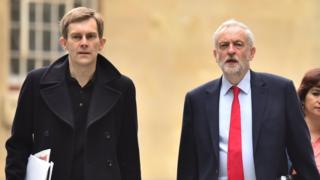[ad_1]

Image copyright
PA Media
Jeremy Corbyn and his adviser Seumas Milne both remain in their jobs following Labour’s election defeat
Labour MPs who lost their seats in the election have called for “fundamental change” at the top of the party.
In a letter to the Observer, the group said “cronyism” in the party and Labour’s “unwillingness” to stand up to anti-Semitism were repeatedly raised as issues on the doorstep.
An “unflinching” look at the causes of Labour’s defeat was now needed, they warned, rather than a “simple review”.
A panel has been established to look at Labour’s election failure.
The party lost its fourth general election in a row on 12 December, recording its worst performance, in terms of seats, since 1935, as a string of constituencies in its traditional Northern strongholds fell to the Conservatives.
Some MPs who lost their seat have blamed Mr Corbyn’s unpopularity with voters, while others have argued Brexit was the main reason for the party’s defeat.
A review launched by Labour Together – a network of activists and figures in the party that includes former leader Ed Miliband – will view attempts to pin the blame on a single cause, such as Brexit or Jeremy Corbyn’s leadership, as simplistic and wrong.
But in their letter, defeated MPs including Mary Creagh and Anna Turley said the scale of Labour’s defeat meant it needed to go “way beyond a simple review”.
Image copyright
Reuters
Former Labour MPs, including Mary Creagh, said Labour needed to go “way beyond a simple review”
“We were rejected on doorsteps not just because of our woolly, changing position on Brexit, or in Scotland because of our weak commitment to the union, but because the very people we were supposed to be fighting for did not think the policies in our manifesto related to their lives.
“The focus on nationalisation and uncontrolled spending commitments meant people simply didn’t believe us. Sadly, this was particularly true with those most affected by the poverty and injustice that 10 years of Tory government has created.
“Lastly, cronyism at the top of our party and repeated unwillingness to stand up to the stain of anti-Semitism were constantly relayed back to us on the doorstep, shaming the traditional values of our once great anti-racist party.”
Image copyright
Reuters
Yvette Cooper said Labour needed to “show humility” and “be ready to change”
Mr Corbyn has said he will stand down as leader “early next year”.
So far, Emily Thornberry and Clive Lewis have both officially entered the contest to replace him, though others including Sir Keir Starmer and Rebecca Long-Bailey are expected to join them.
The former Labour MPs said the eventual winner faced an “immense” challenge.
“We need to win 150 seats in every corner of the country, gaining votes from a coalition of communities.
“Labour needs to be in government – and for that, fundamental change at the top of our party is required. Only this will help us recover from the catastrophic loss of 12 December.”
‘Broad church’
Meanwhile, Yvette Cooper, another Labour MP considering standing to be leader, said the party needed to “show humility” and “be ready to change”.
Writing in the Sunday Mirror, the MP for Pontefract, Normanton and Castleford, said concerns about Mr Corbyn and national security were among the reasons voters she encountered gave for why they did not vote Labour at the general election.
Ms Cooper, a former cabinet minister, said Labour needed to be a “broad church” and resist the “pressure to be a factional or narrow, hard-left party”.
[ad_2]
Source link

